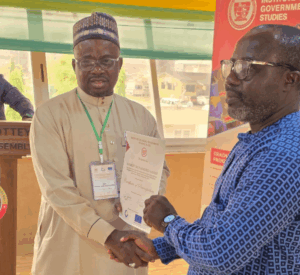Agriculture And Health Nexus in Fight Against COVID-19 Pandemic
This post has already been read at least 111131 times!
By Abba Yakubu Abdullah
All my life, which extends beyond a half century span, malaria and common cold have been my two major afflictions.
Malaria, I have come to recognize its early symptoms and always take care of it with appropriate drugs and for the common cold, I usually let it take its course of three to five days and I am done with it.
As I get older, I started taking supplements especially vitamin C to boost my immunity. However, with the advent of the COVID-19, Zinc tablets was added to my treatment regime after I survived a serious cold attack which lasted for about two weeks.
Luckily, I was told by a doctor that it wasn’t COVID-19 and many people have been having similar long lasting cold attacks. Perhaps, the common cold virus is in solidarity with the COVID virus in making sure humans have a taste of the power of microbes.
Before the advent of the pandemic, zinc is mostly heard in the prescription to children who suffer from diarrhoea, but with the advent of the COVID-19, zinc has become drug supplement of choice by doctors and is prescribed to all COVID patients and many common cold victims like me.
Zinc is an essential micronutrient associated with over 300 biological functions and is known to play a critical role in biological processes including cell growth, differentiation and metabolism and its deficiency restricts childhood growth and decreases resistance to infections, which contribute significantly to morbidity and mortality in young children.
Although severe zinc deficiency is rare in humans, mild to moderate deficiency may be common, especially in populations with low consumption of zinc-rich animal-source foods and high intakes of foods rich in phytates, which inhibit zinc absorption. Mild to moderate deficiency may be difficult to diagnose, as signs and symptoms such as increased susceptibility to infections and growth retardation are shared with other nutrient deficiencies and childhood illnesses.
In addition, Zinc helps the immune system fight off invading bacteria and viruses like the common cold, SARS, COVID and other members of its family. The body also needs zinc to make proteins and DNA, the genetic material in all cells and during pregnancy, infancy, and childhood, the body needs zinc to grow and develop properly.
In 2018, I attended a Study Tour and Training Program on Technology Advances in Agricultural Production, Water and Nutrients Management by the International Fertilizer Development Centre (IFDC), Muscle Shoals, Alabama USA.
In many of the papers presented, zinc is mentioned as one of the important micronutrients that is important to both plant growth and human health. The Centre has a specialized research on nano production of zinc for use in fertilizer production.
Chemical fertilizers are responsible for between 40 and 60 percent of the world’s food supply and started the World’s Green revolution. Crops need 14 essential nutrients, however, in Nigeria, NPK (15-15-15) is the commonly used fertilizer until recently when the formular was changed to NPK (20-10-10), i.e. Nitrogen was increased to 20% while Phosphorous and Potassium were reduced to 10% each under the Presidential Fertilizer Initiative.
It is obvious that only macronutrients are considered in Nigeria’s fertilizer formulation with no consideration to micronutrients for nutritional health of the consumers of the farm produce.
Zinc is one of the important micronutrients that is required for healthy growth for both plants and humans and therefore provides a nexus between agriculture and human health especially under the current pandemic season. Low bio- availability of Zinc not only reduces plant productivity, it also impairs nutritional quality of the harvested products by lowering Zinc density in seeds/grains.
The deficiency of zinc in humans has its origins in the zinc status of agricultural soils and the consequential low amounts of it in staple food crops.
Consuming foods with elevated Zinc concentrations is expected to result in an immediate positive impact on human nutrition and consequently on human health. Agriculture is the primary source of all nutrients required for human life in Nigeria. However, Nigeria’s agricultural system do not provide sufficient nutrients output to meet human nutritional needs for a healthy living.
One of the possible solutions to correct this deficiency in Nigerians is by food fortification or biofortification of the major staple crops produced for consumption. A fast and cost-effective way of addressing zinc deficiency in soils, crops and humans is by adding Zinc into Fertilizers formulation for crops production.
Furthermore, addition of Zinc in the fertilizer formulation could increase yield of crop by 15% and reduce the quantity of fertilizer application by 50%.
Nigeria is beset by significant micronutrients (especially zinc, iron and vitamins) deficiency problems that are rife in soils, food crops and human diets. In a study in 2007, it was found that only about 0.9 percent of Nigeria’s land mass has adequate amount of zinc in its soil mostly found in parts of North West and Niger Delta regions.
However, Zinc is readily available in Nigeria from mines especially in North Western Nigeria and surprisingly could easily be harvested from used car tires, littering all over Nigeria, which contains 1-2% zinc by weight.
Whereas the direct linkage that exists between soil fertility, crop nutritional quality and human nutrition as expounded above, Nigeria’s, current emphasis in agriculture has been on increasing food production quantitatively, with little effort being made in the area of qualitative crops production. The focus here is our star of the moment, zinc, considering its immense positive effects on crop productivity, environmental benefits and crop nutritional quality.
It is therefore imperative under the new normal caused by the COVID-19 pandemic for Nigeria as a matter of policy to start the inclusion of zinc into fertilizer formulation for the environmental, economic and health benefits that could be derived.
This will impact greatly in reducing the cost of agricultural production by reducing the amount of fertilizer per production as well enhance immunity in human that will positively impact on the health of Nigerians.
Abba Yakubu Abdullah, PhD. FFS, FNAE, FIMC, the Special Adviser to Katsina State Governor on Agriculture, can be reached via aquagric@gmail.com
This post has already been read at least 111131 times!















